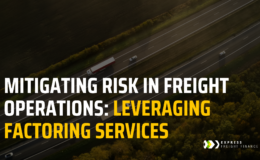The E. coli outbreak, which was traced to romaine lettuce shipments, cause a major disruption in the trucking industry. Now, romaine lettuce is safe to ship, buy, serve, and eat again. So looking back, how could the situation have been handled differently.
The Pros and Cons of Blockchain
Some industry analysts believe that blockchain technology could have reduced the outbreak of E. coli in romaine lettuce. Since blockchain technology can track shipments from their points of origin to their destinations, the outbreak could have been targeted, and the recall could have happened much faster. This, however, omits that blockchain technology doesn’t perform diagnostics on the shipments themselves. In other words, the outbreak still had to occur for there to be a recall. Sure, blockchain could have halted future shipments until the CDC declared that romaine lettuce was once again safe, but the problem could not have been caught ahead of time.
Recall and Disposal Logistics
When the recall on romaine lettuce was announced by the CDC, there were still many shipments in transit. This caused a major disruption to logistics, as drivers and fleet owners now had the added burden of finding a place to dispose of the lettuce. Entire truckloads of romaine lettuce infected with E. coli can’t just be dumped by the side of the road – special arrangements must be made at facilities. Time and money are lost in the process, and trucks that would otherwise have been freed up for new shipments were driving around to dispose of produce. The timing of the recall during one of the big busy seasons for the trucking industry didn’t help.
Romaine Lettuce and Unknown Costs
No one can yet estimate the total economic impact of the recall on romaine lettuce. Grocery stores, restaurants, general consumers, produce growers, and the trucking industry all lost time and money because of this recall, not to mention the medical expenses of those who were infected. The conservative estimate on the shipments of lettuce that were dumped comes to a loss ranging in the tens of millions. The outbreak itself was identified as originating in a region spanning from Arizona to California. Fortunately, there were no deaths, but there were 43 identified cases across 12 states, which resulted in 16 hospitalizations. Currently, the FDA now requires produce to be tagged with labels clearly displaying the point of origin, to help isolate future outbreaks more quickly.
Hopefully, this won’t happen in the future. But if it does, these new measures could save truckers and the shipping industry a lot of precious time and money, and preserve the health of the general population in the process.







